- Home
- R. L. Naquin
Unfinished Muse Page 11
Unfinished Muse Read online
Page 11
Still. She kind of made it seem ominous. Like being a Legacy was a protection I’d regret not having. Certainly, it would be nice if I didn’t have to fear being sent to the Underworld if I failed at my job.
But maybe I was reading too much into it. More money would be welcome, regardless.
I knocked on Mom’s door, then went inside without waiting. She wasn’t in the living room, so I searched the rest of the house, finally ending at the back door to the kitchen. From my vantage point on the wooden deck, I could see her shadow moving around inside the greenhouse.
Before I had a chance to walk out there, the greenhouse door slammed open and she ran out, barefoot, waving her arms in the air. If it had been anyone else, I’d have been alarmed.
But no. It was my mom. Cora Greene. Even before her mind had started slipping a little, she’d been weird.
So, I waited and watched. She came around the corner of the greenhouse, flapping her arms, whirling around a few times, then running full tilt to the other side of the building. I watched her do it three times before she slowed.
I walked down the steps and waited for her to return on her fourth circuit.
She saw me and stopped, her chest heaving from exertion. “Wynter. Hello. I’m so glad you’re here.” She bent over with her hands on her knees while she caught her breath.
I lowered my head to look her in the eye. “Are you okay?”
She waved her hand at me. “I’m fine. Fine. Just got a little winded.” After a moment her breathing returned to normal and she straightened. “That’s better. I didn’t realize I was so out of shape.”
I touched her sleeve. “What were you doing, exactly?”
She held her arms out. “I accidentally sprayed myself with the hose. I was trying to dry my clothes out.”
I stared at her without blinking. I had no words. Nothing I could say seemed appropriate.
She didn’t wait for a response and linked her arm through mine. “Come inside. I’ll make you some lemonade, and we’ll talk about that new boyfriend of yours. Have you had dinner?”
I sighed. She’d keep asking if I didn’t answer. “No boyfriend, Mom. We broke up.”
She patted my hand. “He’ll come crawling back, honey. You’ll see. Men like that can’t stay away from women like us. How about the bank? Did you get the promotion, yet?”
Most of the time I spent visiting my mother, she aggravated me with her weird behavior and her lack of truthful answers about where I came from. But more and more, I was worried. Her short-term memory lapses were less eccentricity and more a potential medical problem. Getting Mom to go to a doctor was nearly impossible though. She preferred her unguents and tonics to Western medicine. She didn’t trust doctors.
I’d have to keep a closer eye on her.
We drank lemonade, ate leftovers of a vegetable and quinoa casserole she had in the fridge, and talked about my new job. I had to be careful not to mention my job title or the name of the company I worked for, but she didn’t ask. I described my clients and told her about how I was helping to motivate them.
She chuckled. “That’s perfect for you. You’ve always been good at telling other people how to do stuff.” She graciously didn’t mention how I lacked that ability with myself. “Are you meeting lots of new friends?”
I shrugged and chased a mung bean around my plate with my fork. “I don’t interact with a lot of work people. Mostly, I’m out in the field.”
“But surely you’ve met a few people.” She reached over, picked up the slippery bean between her fingers, and stuck it on my fork. “You’re not being yourself, are you?”
I shrugged and ate the bean. “I’m trying, Mom.”
She smiled, as if I’d told her I’d won Miss Congeniality at the prom. “Well, then. You’ll succeed.” She stacked our plates. “I think I’ve got some appleberry pie in there. Let me check.”
While she busied herself cutting perfect triangles of apple-raspberry pie, I considered what she’d said. I did need to be less…me. I could have walked the length of the office and met all those people having birthday cake. I had phone numbers for three really nice people I’d met in training. But I’d made no effort. I needed to be less like myself.
But not knowing exactly who I was had become part of the problem.
“Mom?”
“Mmm?” She dropped a generous dollop of homemade whipped cream on top of the pie.
I paused, saying a silent prayer to whatever god ruled truth. “Will you tell me about my dad?”
She stood for a minute, wiggling the whipped cream into a decorative swirl, then quietly put down the spoon she was using and brought the plates to the table. “Why is it so important, Wynter? Aren’t I enough?”
My heart squeezed in my chest. “It’s not that, Mom. You’ve been a great parent. You raised me by yourself, and I’ve never needed anything. I just wish…” I stopped, wondering what exactly I wanted from this conversation. If I were being honest with myself, I’d have to admit it had nothing to do with pay grades and better cafeterias. “I just want to know who I am.”
She sighed and looked me in the eye. “The truth is, my darling, I didn’t really know your father very well. I didn’t want you to know the truth because I didn’t want you to think less of me.”
I frowned and placed my hand over hers. “Nothing in your past could make me think badly of you, Mom. I don’t expect you to be perfect. I’ve made too many of my own mistakes to judge.”
She flipped her hand over to hold mine. Her eyes were filled with sadness. “I used to be married, a long time ago.”
My eyebrows rose, and I started to speak, but she stopped me.
“No. He wasn’t your father. I cheated on him with a man I barely knew. And when I found out I was pregnant, I ran away rather than face my husband.” She dropped her voice to a whisper. “He had a terrible temper.”
“That’s why we moved around so much when I was a kid?”
She nodded. “I ran away, and we’ve been running ever since.”
I put my arms around her and hugged her. “I’m so sorry, Mom.”
She hugged me back, then pulled away, her expression confused. “Why on earth is my shirt wet?”
~*~
By the time I got home, it was well after dark. I trudged into the apartment through the front door, dropped my keys and purse on the table, and went to the kitchen for a glass of water. Phyllis was on the window ledge, basking in the moonlight.
“How was your day, dear? Get a lot done? Make new friends? What’d you have for lunch?” She sounded genuinely interested, as if staying home alone all day wasn’t much fun. I guessed it probably wasn’t.
I shrugged. “The day had its ups and downs. I have two clients now.”
“Already?” Her leaves shivered in excitement. “They must think you’re doing a good job to already give you more responsibility.”
My voice was thick with sarcasm. “Yeah. I’m sure that’s it.”
“Don’t you think you’re doing a good job?” One of her leaves dropped in the sink.
I sighed. “I think I’m doing the best I can.” I touched the dirt in her pot. “You feel a little thirsty.” I ran water in a glass and poured some into her soil, then drank the rest. “I had dinner with Mom tonight.”
“Wonderful! How was she?”
“Troubling.” I refilled my glass while I thought about how to tell my houseplant what was bothering me. “Phyllis, you saw Mom last week. You saw how…absent-minded she is, right?”
“I did, yes.”
“Do you think I should worry? Do I need to intervene?”
“What do you mean, dear? Like put her away or something?” Her leaves went still.
“No. Yeah. I don’t know. She’s getting worse. I’m worried that I should do something. Should she be living alone?”
“Oh, I don’t think you have anything to worry about just yet. She’s fine.”
“Are you sure?”
“I am.”
My lip twitched, but I stopped myself from laughing.
Phyllis wasn’t fooled. “What’s so funny?”
“Nothing.” I glanced out the window. “Did the neighbor come out naked again today? What did I miss?”
The silver-painted tires were gone from the courtyard. Instead, a pile of wooden planks sat off to the side with a half-finished wooden box next to it. It looked as if he had a new project, and it wasn’t finished yet.
Phyllis brushed the back of my hand with a branch. “I don’t know what that boy is building, but he’s been at it for days. I think the smaller projects are part of one big thing.”
“But what is it?” I looked away and put my glass in the sink.
“Who knows? But he certainly likes to walk around without his shirt.” She snickered.
I groaned. “Tease. I’m going to bed. Say a prayer to the gods that tomorrow is easier on me.”
As I walked down the hall, I heard her answer me in a soft voice. “If I did that, how would you learn anything?”
~*~
On Wednesday, I popped in on Alex and watched him finish a toothpick section of garage on his house model. The work was smooth, and he didn’t need anything from me. In fact, he hummed to himself while he worked and ignored Oscar when the dog whined at me.
After a half hour or so, I was satisfied with his progress and left.
When I walked into Missy’s apartment, I found her in the same place she’d been sitting the day before, but this time the baby was in the swing, cooing and chewing on a rubber ring shaped like a bunny.
Missy thumbed through a pile of gold, blue, and maroon paper, each page with a different pattern on it. She tapped the stack against the table and started over.
Halfway through her third try, she groaned and dropped the pages. “Cassie, I don’t even know where to start.”
Cassie burped and dropped her bunny ring on the floor.
Missy crawled over to the swing, retrieved the teething ring, and placed it in the tiny, chubby hand. “Mommy sucks.” She spoke in a cutesy, cooing voice that made the baby giggle. “Mommy needs a wine break. Yes she does!”
I glanced at the clock on the cable box. It was quarter to eleven. I really hoped she wasn’t going to open a bottle of wine. There was no telling how the Thought Bubbles would interact with alcohol, especially this early in the morning.
But Missy didn’t go to the kitchen. She crawled back to the coffee table and opened a second package of brightly colored paper—this one in greens and purples and yellows.
I unlatched my bottle and blew like a tornado. The entire room was filled with bubbles.
“Don’t pick a pattern, yet. Remember what we said yesterday? Little bites. Pick a photo, first. Start from there.” I blew another stream of bubbles.
She frowned and put the papers down, then fanned out a pile of old photographs. After a moment of fierce concentration, she placed her finger on a shot of two women and two men on a picnic, hamming it up for the camera. “What do you think, Cassie? Shall we start with their first date?”
And just like that, the pieces for the first page fell into place. She chose a solid light brown sheet of paper for the background, then added several different green and darker brown patterns to it. Before long, she was cutting and stamping and trimming like a pro, and the page was on its way.
After watching what she was doing for a time, I finally figured out what the point was. She was telling a story. This was a photo of her parents on their first date, and she created objects around the photo that both drew out the story—stickers of sandwiches and wine bottles—and made the photo pop by decorating around it in ways that simply made it more attractive.
It was a photo album in which each page celebrated and expanded on an individual picture.
Once she’d chosen the layout and cut all the parts to fit her vision, she grabbed a gun that held double-sided tape and put the first piece on permanently.
“Well, that’s actually kind of nifty,” I said. My stomach rumbled. “I need food. Think you can handle it from here?”
Missy sang to Cassie while she dragged the gun across a dark green and gold plaid strip. The baby dozed in her swing and hiccupped in her sleep.
“Okay, then.” I waved. “Great work, Missy. I’ll see you tomorrow.” I held my breath and backed through the wood of the door. No one noticed me go. It was a little disheartening.
Being invisible kind of sucked. When things went well, there was nobody to high five me.
Still, I was so pleased with myself and the progress both my clients were making, I was halfway down the road before I realized I hadn’t hit the button on my belt to become visible again. Fortunately, nobody seemed to have been watching my car pull out and drive down the street by itself.
Of course, my self-congratulations were short lived. After a quick burger, I went back to the office.
A third client order sat in my inbox.
I stared at it, rage replacing my earlier cheer. “Son of a bitch.”
Polly’s office door was closed and the lights were off. I toured the entire room, hoping to find someone. Anyone.
Nope. The office was empty.
I returned to my desk and smoothed the paper I’d crumpled in my fist. Mark Willoughby. And he lived in my apartment complex.
My next client was the weird, shirtless guy across the courtyard.
Chapter 12
Having my neighbor as a client brought a dilemma I hadn’t expected. Should I go all the way out there, get him started on his project, then go all the way back to work to hang up my belt? Or should I hang on to the belt and stay home afterward?
It seemed like a waste of time, gas, and energy to drive across town when I would be there again in the morning.
I debated with myself all the way home. By the time I pulled into my regular parking space, I’d decided it came down to one thing: no one had specifically told me not to keep the belt overnight.
After all, if I were a mechanic, they wouldn’t expect me to drive back to return the tools, would they? Of course not. If they weren’t going to lay down any rules, I would make my own.
I went into my own apartment first and dropped off my purse and keys. Glancing out the window, I found Mark—now I had confirmation of his correct name—standing in the courtyard again, staring at the unfinished boxy thing I’d seen the night before.
“He’s been out there for an hour staring at that thing,” Phyllis said in a hushed voice.
“Well, guess whose job it is to help him?” I did a twirl for my houseplant to show off my well-appointed, fancy belt.
“You’re joking.” She sounded appalled.
“Nope. I’m not off the clock yet. See you in a bit.” I touched the button on my belt and went invisible.
Before I stepped through my closed back door, I reached out to touch Phyllis, hoping to startle her.
“I can still see you, Wynter.” She waved a branch at me.
“Well, that sucks. It didn’t malfunction, did it?” I adjusted the belt and looked to see if anything was wrong—not that I’d be able to tell.
“It works. It just doesn’t work on me. Move me to the left a bit before you go, would you? I can’t see the entire courtyard. I don’t want to miss this.”
I was tempted to move her to the bathroom where she wouldn’t be able to see anything, but I adjusted her until she was happy. “I’ll be back in a bit.” I drifted through the door into the sunlight.
The work order had said urban renewal on it, nothing more. It did have the deadline on it—no surprise, it was twenty-eight days. But the explanation and requirements field had been left blank. Whatever the hell Mark was working on, nobody knew how to describe it.
That didn’t help me one bit.
He stood over the ha
lf-built, boxy structure with his hands on his hips. After eyeing it for a long moment, he moved to the other side and did it again.
Finally, he shook his head and grabbed a hammer from the tool belt slung low over his hips. “It’s too small. And the wrong shape.” He pulled a board off the side using the claw side of the hammer. “It’s all wrong.”
I had no idea how long it had taken him to build the frame for whatever this was supposed to be, but it came apart faster than I expected.
“Talk to me, Mark. What are we making here?” I paced around him, squinting and trying to imagine what the intent had been. “Urban renewal. Is it a garden plot? A compost bin? What?”
He pounded the nails out of the planks, then dropped the planks in the pile they’d come from. “Back to the drawing board.”
“Come on, buddy. Give me something. Tell me about the silver tires you painted over the weekend, at least.”
Mark appeared to be a lot more Zen about the situation than I was. I was ready to tear my hair out. He stood there with his arms folded and his face tilted to the sun while he thought mysterious thoughts about whatever he was making.
The angle of his chin highlighted the stubble on his jaw. I’d never seen him up close before, and with the sunlight reflecting the reddish highlights in his dark hair, I wanted to reach out and touch that stubble to see if it was soft or scratchy.
But I didn’t. For one thing, my hand would have gone right through him. For another, Phyllis was watching through the kitchen window.
I cleared my throat. “Okay. I don’t know what you’re trying for, so I don’t know if this will work or not, but let’s give it a try.” I unhooked my bubbles and pulled out the wand. “You can make it work, Mark. You already know what you want to make. You just have to trust the idea is a good one.” I blew a stream of bubbles.
The wind picked up, and every last one of them flew over his left shoulder.
“Crap.” I jogged around to the other side of him and tried again. “Trust in yourself. You can do this.” I blew another stream of small bubbles, hoping my aim would be better and that my vague thoughts of encouragement would help.

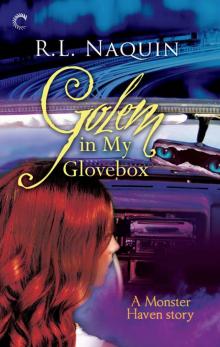 Golem in My Glovebox
Golem in My Glovebox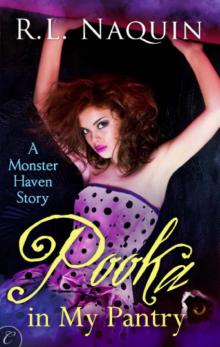 Pooka in My Pantry
Pooka in My Pantry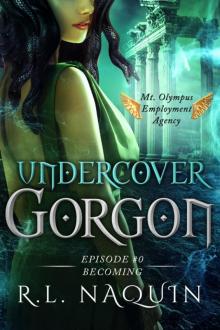 Undercover Gorgon: Episode #0 — Becoming (A Mt. Olympus Employment Agency Miniseries)
Undercover Gorgon: Episode #0 — Becoming (A Mt. Olympus Employment Agency Miniseries)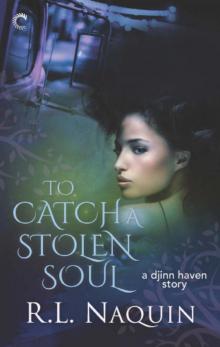 To Catch a Stolen Soul
To Catch a Stolen Soul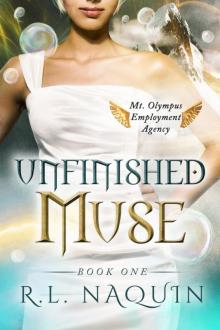 Unfinished Muse
Unfinished Muse To Seize a Wayward Spirit
To Seize a Wayward Spirit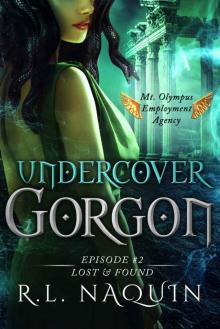 Undercover Gorgon: Episode #2 — Lost & Found (Undercover Gorgon: A Mt. Olympus Employment Agency Miniseries)
Undercover Gorgon: Episode #2 — Lost & Found (Undercover Gorgon: A Mt. Olympus Employment Agency Miniseries) monster haven 06.5 - transmonstrified
monster haven 06.5 - transmonstrified Demons in My Driveway
Demons in My Driveway Unamused Muse (Mt. Olympus Employment Agency: Muse Book 2)
Unamused Muse (Mt. Olympus Employment Agency: Muse Book 2)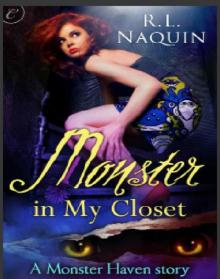 Monster in My Closet
Monster in My Closet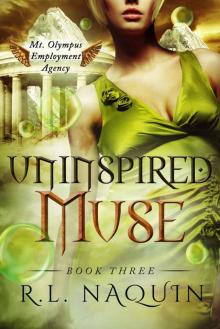 Uninspired Muse (Mt. Olympus Employment Agency: Muse Book 3)
Uninspired Muse (Mt. Olympus Employment Agency: Muse Book 3)